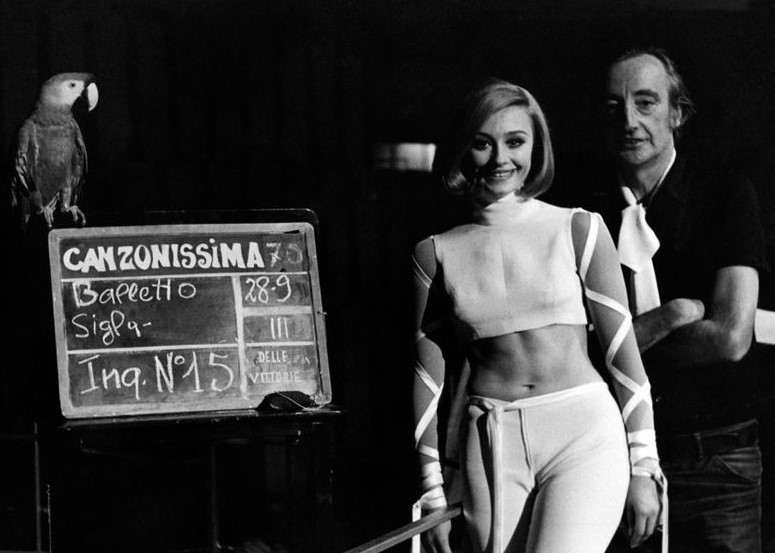
 Riccardo Buttarelli
Riccardo Buttarelli
Italian entertainment: Raffaella Carrà, the never-diva icon that changed Italy
- WTI Magazine #141 Jul 17, 2021
-

 Riccardo Buttarelli
Riccardo Buttarelli
Raffaella is no more. For everyone "la Carrà", with the accent on the last a, as she emphasized to David Letterman in an interview in 1986.
On July 5, 2021 died the most important woman in the history of Italian entertainment, by far, who for decades exported the best face of our country abroad. It is no coincidence that she was particularly successful in South America, she was not only spontaneous and extroverted, but she was a people’s woman.
Raffaella Maria Roberta Pelloni was born in 1943 not from humble origins. Her family was well-to-do and she has always repudiated the rhetoric of the Cinderella who becomes a princess. She grew up first in Bologna, then in Rome where she studied at the Classical Dance Academy of Jia Ruskaia for many years. Pretty soon she was told that she would never be successful in dancing because of her "too thin calves". Young Raffaella did not lose heart and began studying acting. This is when her career as an actress began.
She made a fair number of films, and there is an anecdote that few people know: in 1965 Frank Sinatra met her on the set of Colonel Von Ryan and fell in love with her. During an interview a few years ago she recalled how "Frank called me Mrs. Von Ryan, he was very courteous and, at that time, he wanted to get married. I admired him, but I used to listen to the Beatles. His magnetic eyes didn't make me fall in love."
She signed a contract for two more years with 20th Century fox, but soon left because she found Los Angeles boring. So she arrived to the Italian television, with a fiction where she acted with Domenico Modugno called Scaramouche. This is when A RAI author had the idea of renaming her "Carrà". It was the beginning of a legend.
But Raffaella was not just an actress, and so she began to participate in live television shows in which she was able to show all her talent. Raffaella was eclectic: she danced, acted, sang, was sunny and friendly, the Italian audience could not get away from the screen. Television loved her, and she loved entertaining the Italians bringing in their houses fun and joy, good music and a revolution in style and fashion.
At the turn of the 70s, immediately after 1968, Raffaella represented in the Italian television and thus in the Italian society the real breaking point of the female figure, at the time still linked to a Catholic tradition that saw women go on TV dressed very sober.
The authors of those years wrote for her simple and rhythmic melodies that entered in the history of Italian music and still today are known and sang by all Italians. But together with her dancing rhythm that anticipated disco music, the lyrics were sparkling, with double entendres and a bit of explicit reference that today would make us smile because what we call explicit today is very different, but at the time were seen as revolutionary and daring. Raffaella Carrà broke through the glass wall of censorship and Italian respectability song after song, with her short dresses and showing for the first time her navel live on tv, always with huge class and education, without provoking and without disrespect, but always taking the permitted and accepted taste a bit further, with a wonderful smile, an incomparable elegance and a charisma that only Italian women can have. Her songs would make Italians happily dance and sing while accompanying them away from post-war bigotry towards a freer and more modern, young and advanced society.
The most famous moment of this gentle revolution was the Tuca Tuca, a decidedly sexy dance for the year in which it was proposed on television, 1971. The homes of Italians were not yet ready for an elegant but explosive blonde, beautiful and never vulgar, who sang "Tuca Tuca" (tuca recalls the verb tocca, to touch) and danced simulating a continuous touching between her and her dancer partner. It was a scandal that accelerated the innovation of the customs of Italian society of years. And it did so without a hint of vulgarity, rudeness or bad taste.
Her jaunty bob haircut, her colorful and bold stage costumes, her sexy moves embarrassed the church and the parties of the Italian government of the time. In this she was phenomenal, because she never made it an ideological issue, but with her spontaneity and naturalness involved the popular spirit of those years that was naturally leaning towards a revolution all over the world, and led it to emancipate from previous habits. A real revolution made of simple gestures and not much flaunted: Carrà represented a festive normality, a contagious feeling of joy and fun in an innovative but never excessive way.
She was maybe too advanced for those times, and after the Tuca Tuca RAI, the Italian public television, decided to limit her appearances for some time, intimidated by the enormous success of her innocent and light but also decidedly new ways, too ahead for a country still very slow to accept changes not decided from above.
One of her main characteristics was the enormous success she had in Spain and South America, perhaps the greatest ever for an artist who was not born in a Spanish-speaking country. The post-Franquist Spain, fresh out of a dictatorship and with an impetuous desire for freedom, eas the perfect pitch where to land her happy and colorful revolution. That blond hurricane entered the homes of Spanish families right after the news, with a TV program that was breaking any possible tradition ever seen before. Imagine the impact that a diva in shiny leather boots and libertine costumes could have on a country that until the day before had experienced a dictatorial repression, right in the middle of the Western world. Raffaella Carrà simply had to translate her songs verbatim from Italian into basic Spanish to win the hearts of an entire nation. The girls in Spain began to cut their hair in a bob with bangs as a sign of freedom, emancipation, feminism, just like Italian girls had done before them.
Inevitably, without doing anything particularly disruptive or provocative, without any ideological statement and with the non-trivial sweetness and sensitivity that a revolution requires to win the hearts and minds of those accustomed to a very different world, Raffaella began to introduce the theme of homosexual love, with some smiling references in one song, with the simplicity of the acceptance of a normal story between two people in love in another text. With patience and without frightening anyone, she began to become, without wanting to, and without knowing it, the idol of the communities that today we call LGBT, but which at the time were simply groups of discriminated, frightened and insulted boys and girls who for the first time found in the innocent cheerfulness of Raffaella Carrà the recognition of their right to love whoever they wanted to love. It was not a political fight, it was just joy, love and happiness. It saved lives, with her smile.
The third artistic life of Raffaella started in the 80s, when she literally invented the midday television in Italy. With her simplicity, her smile, her irony, her joy, her education, she was the perfect host for a program that would make Italians feel home: the Italians who would watch tv at noon, the women who would be home to prepare lunch. She cuddled them, convinced them to feel important, represented them and made them, in the Italian television that was becoming commercial, a fundamental target that decisively advanced the recognition of the role of women in Italy, another revolution that still has to be completed, in Italy and beyond. She then got back to the prime time television, still dancing and singing but in a more relaxed and non-revolutionary way.
Her big heart, her spontaneity, her eternal happiness have shaken the Italian and Spanish popular face, all the more reason that she, who could not have children but had adopted many, had arranged to leave her assets to charity.
A not tiny part of today's Italian open-mindedness is owed to Raffaella Carrà, who made us grow as a country, who taught us how to survive and go on: one of the most famous lyrics of one of the many hits that she left us says “e se ti lascia lo sai che si fa? trovi un altro più bello che problemi non ha" which translates with “and if he leaves you, you know what you do? You find another more beautiful that has no problems.”. Today it may seem like a simple, naive, trite verse to us. But Raffaella Carrà sang it in 1978, and only three years later, also thanks to the great success of her song, Italy will abolish the honor killing, the absurd law for which the homicide in order to safeguard the honor (for example the killing of the adulterous spouse or of her lover or of both) was sanctioned with smaller penalties in comparison to an equal homicide for different motives.
Ciao Raffaella, and thanks for how you drive Italy into the future, with your belly on display, one dancing step and one funny song at a time. We will never stop listening to and watching and following your kind revolution.